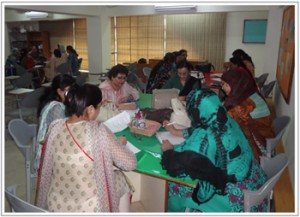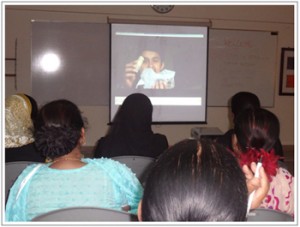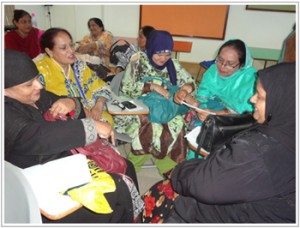Workshops for CARE Foundation Teachers
TRC conducted three workshops for government school teachers supported by the Care Foundation. The workshops were conducted over three consecutive Saturdays in October 2012, by TRC facilitators Nighat Hasan and Tabinda Jabeen. The first workshop Tadrees kay Moassar Tareeqay was conducted on October 06, 2012 in a government school at Akhtar Colony, Karachi. The focus of the training was Teaching Methodology and it sought to equip teachers with a basic understanding of how children learn and the role of the learning environment in nurturing their holistic development.
The second workshop, conducted on October 13, 2012 was titled, Mansubabandi aur Kamra e Jamaat ka Nazm o Zabt. This workshop focused on Classroom Management and Lesson Planning and sought to enhance participants’ understanding of the purpose and function of planning and classroom discipline. The workshop highlighted promoting pro-social behaviour and explored the underlying causes of children’s “misbehaviour.”
The third workshop in the series was titled, Ashiya e imdadi ka Moassar Istemaal; it was conducted at TRC on October 20, 2012. The workshop highlighted the use of low-cost and no-cost teaching aids for classroom activities. Sixteen teachers from the pre-primary to the secondary level attended the multi-grade workshops.
Workshop for PARCO at TRC
A nine-hour workshop titled ‘How Children Learn’ was conducted for public sector schools that are supported by PARCO, from October 22 to 24, 2012 at TRC. Nighat Hasan and Tabinda Jabeen facilitated the workshop, which was attended by 25 primary and secondary school teachers.
The workshop focused on helping teachers understand how children learn and also the wide range of roles and responsibilities of a teacher. The participants were introduced to domains and stages of development, and the basics of an active learning environment. During the workshop, the participants took part in hands-on activities, group work and large group discussions.
TAKE Conference
On October 04, 2012, TRC’s Sr. Manager Membership Network, Rubina Naqvi presented a paper on ‘Understanding the Needs of the Child’ at an education conference organised by TAKE (Trust for Advancement of Knowledge and Education). The conference was held in Karachi for professional educators in association with the Institute of Education, University of London from 2-4 October. The theme of the conference was ‘Progress in Learning’ and the session was attended by approximately 50 educators from different institutions.
TRC’s presentation was an interactive one, and enriched the session with valuable input from the attendees. It focused on the factors that impact the development of a child, including the role of the environment and the school. The presentation was received positively by the audience.
Convocation Ceremony at Fatimiyah Girls’ School
TRC was invited by the Fatimiyah Education Network to attend its convocation ceremony for Matric students of Fatimiyah Girls School on October 20, 2012. Karen Dias represented TRC on this occasion. The event was even more special this year because they were celebrating their twentieth anniversary.
Dr. Kaniz Fizza Azhar, Chief Scientific Officer, PCSIR was chief guest at the occasion. Awards were distributed to high achievers of the Science and Arts group and a slideshow of students’ extracurricular achievements was played for the guests. Teachers and the staff were also recognised for their efforts and awarded accordingly. Special awards were also given to members of the network for their special contributions.
Thematic Working Groups for Sindh Education Sector Plan
The first meeting of all the Thematic Working Groups of the Sindh Education Sector Plan (SESP) was held on Tuesday, October 23, 2012 at the Reform Support Unit in Karachi. All members of the Local Education Groups were invited to attend and Nighat Hasan and Tabinda Jabeen represented TRC on the occasion.
This meeting was essentially an orientation exercise for the thematic working groups. Mr. James Lee, European Union SESP consultant, shared the criteria and key elements of the Education Plan. In his presentation, he talked about the two stages of SESP formulation: conducting a situation analysis followed by the identification of strategies and programmes required to achieve education sector targets. Step-by-step planning of the SESP formulation, timelines and the responsibilities of Thematic Working groups were also discussed.
TRC Presents at the AKU-IED Conference
TRC was invited to attend and present at the ninth international conference on In Search of Relevance and Sustainability of Educational Change. Organised by the Aga Khan University Institute for Educational Development (AKU-IED), the event took place from November 1-3, 2012.
The objective of the conference was to seek, synthesise and share responses to the ‘crisis of relevance’ in the field of education. The proposed themes for the concurrent sessions were, Innovative pedagogies, Learner and learning spaces, Assessment for/as learning, The relevance of the curriculum in changing times, Responsive governance and management and Theorisation of educational change for relevance. Presenters put forward their work through different modes such as paper presentations, symposia, poster presentations, panel and roundtable discussions and others.
TRC’s Rubina Naqvi made a presentation titled The Modular Curriculum. The presentation focused on the concept of a curriculum, its role in effective learning, the four essential factors to consider when planning a curriculum, planning modules for different levels and the advantages and drawbacks of a modular curriculum.
The audience was a blend of teachers, school administrators, teacher trainers as well as researchers in education.
Karachi International Children’s Film Festival 2012
The Karachi International Children’s Film Festival returned for a second installment after a successful run last year and TRC supported the event yet again. Initiated by an NGO called The Little Art, the film festival is a sister event of the Lahore International Children’s Film Festival which is in its fourth year now. This year the KICFF commenced on November 5, 2012 and was held at the Rangoonwala Community Centre, Dhoraji Colony.
The event showcased 37 carefully selected short films, 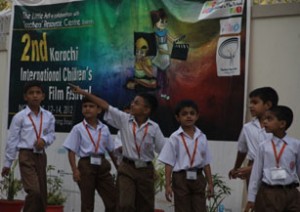 which included both animated and action films from 20 countries across the world. The films were screened over six days (November 5-8 and 12-13) in three one-hour slot shows. Passes for the festival were available at TRC and several schools participated in the event, despite being in the midst of midterm exams and a difficult law and order situation in the city. TRC staff was supported by a group of volunteers in managing the young audience at the venue.
which included both animated and action films from 20 countries across the world. The films were screened over six days (November 5-8 and 12-13) in three one-hour slot shows. Passes for the festival were available at TRC and several schools participated in the event, despite being in the midst of midterm exams and a difficult law and order situation in the city. TRC staff was supported by a group of volunteers in managing the young audience at the venue.
It was heartening to see excited and cheerful young faces lining up to enter the hall to view the films. The children enjoyed themselves thoroughly at the festival and often broke out cheering and clapping. Most went back to school happy after thanking TRC staff and volunteers for making it possible for them to enjoy this unique experience.
Teachers and students gave some very positive feedback after the screenings. Some parents also stopped by at the premises to enquire about the festival and expressed the hope that in future their children would be able to experience more such events.
Sindh Education Sector Plan Working Groups Meet Again
A series of LEG meetings took place in November. All members of the Local Education Groups were divided into 12 Thematic Working Groups (TWG) for the preparation of the Sindh Education Sector Plan (SESP). The working groups met three times from November 5 – 22 at the Reform Support Unit, Education & Literacy Department in the N.J.V. School Building.
TRC is working with two TWGs, namely ECE & Primary (ECE-G5) and Teacher Training. Four weekly meetings were held between November 6 – 27. Nighat Hasan represented TRC in the Teacher Training group and Tabinda Jabeen in the ECE group.
In the first three meetings, the groups worked on situational analysis and focused on the identification of issues, establishing objectives, setting performance targets and formulating strategies and activities. In the fourth meeting some groups were merged as there was some overlap and similarities in all twelve groups. In the final session, the decision to merge the groups was reviewed and a few amendments were made.
New Director British Council Arrives in Karachi
TRC’s Mahenaz Mahmud attended a reception to welcome Barbara Wickham, the new director of the British Council, Sindh and Balochistan at Acton House on November 12, 2012. The reception was hosted by the British Deputy High Commissioner, Francis Campbell. A meeting with Ms. Wickham will be scheduled later to discuss a partnership in teacher education.
Research Students Request TRC for Help
In November, TRC received two requests for research support. The Deputy Director of the Federal Ministry of Information, Ashique Hussain requested material for his research paper, The syllabus of primary schools in Sindh and KPK: Reforms to maintain national standards. Relevant resource material from the TRC library and other sources was shared with him.
A student, Sobia Shamim, who is enrolled in the MA (final) of the Education department at the Jinnah University for Women approached TRC for support for her research on TRC’s role in the educational sector in Karachi through its ECE- CP. TRC supported Ms. Shamim by furnishing her with 20 questionnaires filled by ECE-CP and ECE-CP(U) students as well as 04, by course facilitators.
TRC’s Annual General Body Meeting (AGM) 2012
On 01 December 2012, TRC’s AGM 2011 – 2012 was held at the TRC premises.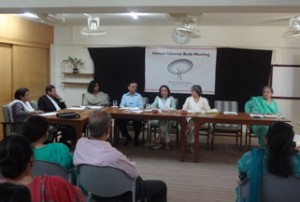 Members of the Governing Board, representatives of member schools as well as staff members attended the event. During the meeting, the Directors highlighted the activities of the year and shared plans for the future. The Treasurer of the Governing Board presented TRC’s financial reports.
Members of the Governing Board, representatives of member schools as well as staff members attended the event. During the meeting, the Directors highlighted the activities of the year and shared plans for the future. The Treasurer of the Governing Board presented TRC’s financial reports.
Our Annual Report has been published online and is available for download here http://trconline.org/trcs-26th-annual-report/.
Launch of the EFA Global Monitoring Report
On December 04, 2012 the EFA (Education for All) Global Monitoring Report (GMR) 2012 was launched in Karachi. Idara-e-Taleem-o-Agahi (ITA) organised the event in collaboration with UNESCO. Representatives of different organisations including TRC, the Reform Support Unit, UNESCO, Unilever and various Technical Education and Vocational Training Centres were present at the event.
The event commenced with opening remarks from Baela Raza Jamil, Director Programmes ITA who shared that the thematic focus of the report is Youth and Skills. Other speakers at the event included Kazi Ayaz Mahessar of UNESCO who presented EFA and its goals and current status in Pakistan. Anwar Ahmed Zai, Chairman Board of Intermediate Education Karachi emphasised the need to empower youth in his presentation and suggested a review of the Education Policy in the context of the 18th Amendment. Nazar Ahmed, Director Operation, STEVTA talked about different skills development programmes while Aziz Kabani of the Sindh Education Foundation, talked about his organisation’s role in increasing enrolment rates and reducing gender disparity, adult literacy and improving education quality. The representative from Unilever’s spoke about the corporation’s hand washing campaign and women empowerment projects. Sagar Samejo, Director of Literacy & Non-Formal Basic Education, Sindh, recommended that non-formal education should be the part of the Education Policy.
In his concluding remarks, the chief guest Pir Mazhar-ul-Haq, Minister Education and Literacy Department, Sindh, announced the government’s intention to revive and link technical and vocational educational in all high schools in Sindh and also spoke about other initiatives undertaken by the provincial government.
Final Meeting of Sindh Education Sector Plan Working Groups
On December 03, 2012 the Thematic Working Groups had their fifth meeting. Tabinda Jabeen represented TRC in the Access Group that comprised the following four Thematic Working Groups: ECE & Primary, Secondary Education, Public Private Partnership and School Rehabilitation & Consolidation.
Dr. Fariha Zafar of SAHE presented on ‘Global Initiative on Out of School Children’. The presentation was based on a research study conducted by UNICEF and the UNESCO Institute of Statistics. After the presentation, the output of the previous meetings was reviewed in light of the study and amendments were made.
On 04 December, the meeting for ‘Teacher Education and Development’ Group and ‘Curriculum’ Group was held. Nighat Hasan represented TRC in this group.
This was the last meeting of the Thematic Working Groups and the framework of the Sindh Education Sector Plan (SESP) is now complete. A core committee comprising of experts and consultants will review SESP; the findings will subsequently be shared with all Thematic Working Groups.
PARCO Workshop in Muzaffargarh, Punjab
On December 10 and 11, 2012, a nine-hour workshop titled ‘How Children Learn’ was conducted in PARCO Colony, Mehmood Kot, Muzaffargarh. This was the second phase of a workshop, which had been conducted earlier at the TRC premises in Karachi. TRC’s Nighat Hasan and Tabinda Jabeen facilitated the diverse group of 20 teachers, which included both male and female teachers teaching different age groups.
titled ‘How Children Learn’ was conducted in PARCO Colony, Mehmood Kot, Muzaffargarh. This was the second phase of a workshop, which had been conducted earlier at the TRC premises in Karachi. TRC’s Nighat Hasan and Tabinda Jabeen facilitated the diverse group of 20 teachers, which included both male and female teachers teaching different age groups.
The workshop covered a wide range of topics such as ‘How children learn,’ ‘Child development,’ ‘The learning environment’ and ‘The teacher’s role and responsibilities’. The participants were actively involved in different activities such as group work, pair work, presentations and discussions.
Feedback from the participants showed that they felt that the workshop provided them with hands-on experiences and new ideas to implement in the classroom. One participant also suggested that future workshops should include a session on the history of education.
Child Rights Convention 2012
TRC was invited to attend The Child Rights Convention 2012 at the Karachi Expo Centre on December 14, 2012. The theme of the exhibition was ‘Protect and Empower the Future of Pakistan’ and was attended by Kamleshwer Lohana, Mehnaz Amirali, Nighat Hasan, Seema Yasmin, Tabinda Jabeen and Uzma Rauf of TRC.
The session began with a history of the CRC, presented by SPARC (Society for the Protection of the Rights of the Child). It highlighted how the mandate of the CRC evolved and eventually centred on children’s rights.
Following this session, speakers who were invited to the convention shared their work and accomplishments in upholding children’s rights.
This was followed by a panel discussion, which focused on the ‘Role of Media in Raising A Voice for Child Rights’ Advocacy’. The selected panelists for this session, which included representatives of NGOs working with children and those working in the media, aired their views on how the media can play an active role in promoting children’s rights.
The convention ended with a symbolic walk organised by KONPAL Child Abuse Prevention Society, an NGO working against child abuse. The walk was held to protest corporal punishment in schools.
Pakaleidoscope
On December 22, 2012 Seema Malik, Mahenaz Mahmud, Uzma Rauf and Mehnaz Amir Ali represented TRC at Paklaleidoscope, an art display by Haque Academy held at The Second Floor (T2F). The colourful display by young budding artists from the primary and secondary level included individual and group work, art installations and pottery inspired by Truck Art, which is one of the unique forms of indigenous art in Pakistan.
Governance of Education in Sindh
On December 31, 2012 the Sindh Education Foundation (GoS) and the AKU – Institute of Educational Development organized an Educational Dialogue on Governance for Quality Teachers, in collaboration with the Strengthening Teacher Education in Pakistan (STEP) Project. Uzma Rauf, represented TRC at this event, which was supported by the Canadian International Development Agency (CIDA) and the Aga Khan Foundation (AKF) Canada and Pakistan.
This session began with a documentary, screening glimpses of the first Educational Dialogue held in July 2012. Following this, selected panelists were invited to share their experiences, views and suggestions regarding recruitment, deployment, professional development and accountability of teachers to ensure good governance. The floor was then opened to questions from the audience. The question & answer session was an engaging and interactive one. Prof. Anita Ghulam Ali concluded the session by summarizing what was shared by the panelists, focusing on the need to develop honesty and critical thinking skills in our children to improve the nation’s future.





